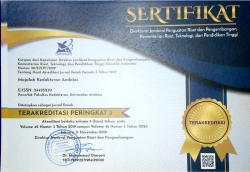Mutasi gen KRAS pada kanker kolorektal
Abstract
Onkogen RAS memiliki peran dalam pertumbuhan dan regulasi sel. Protein ini mempengaruhi banyak fungsi seluler termasuk proliferasi sel, diferensiasi, dan apoptosis. Jika KRAS mengalami mutasi, maka KRAS secara konstitutif akan tetap dalam keadaan terikat dengan GTP. Dengan demikian regulasi kaskade sinyal downstream hilang dan terjadi pertumbuhan sel yang tidak terkontrol. Mutasi KRAS berperan dalam terjadinya 32-40% kanker kolorektal dan hampir seluruh kejadian tersebut disebabkan oleh mutasi KRAS pada ekson 2 kodon 12 dan 13. Hal ini menyebabkan resistensi terhadap kemoterapi yang ditargetkan untuk reseptor faktor pertumbuhan epidermal (EGFR). Tulisan ini membahas peran KRAS dalam regulasi sel normal dan sel kanker, terutama kanker kolorektal. Pemahaman tentang protein ini serta interaksinya dengan protein lainnya dapat mengungkapkan potensi peran prognostik dan prediktifnya dalam agresivitas tumor.
Keywords
Full Text:
PDFReferences
Kopetz S, Chang GJ, Overman MJ, Eng C, Sargent DJ, Larson DW, Grothey A, Vauthey JN, Nagorney DM, McWilliams RR. Improved survival in metastatic colorectal cancer is associated with adoption of hepatic resection and improved chemotherapy. J. Clin. Oncol. 2009;27(22):3677-83. doi: 10.1200/JCO.2008.20.5278.
Bray F, Ferlay J, Soerjomataram I, Siegel RL, Torre LA, Jemal A. Global Cancer in Statistics 2018: GLOBOCAN Estimates of Incidence and Mortality Worlwide for 36 Cancers in 185 Countries. Cancer J Clin. 2018;68(6):394-424. doi: 10.3322/caac.21492.
Abdullah M, Sudoyo AW, Utomo AR, Fauzi A, Rani AA. Molecular profile of colorectal cancer in Indonesia: is there another pathway? Gastroenterol Hepatol Bed Bench. 2012;5(2):71-78.
Kuipers EJ, Grady WM, Lieberman D, Seufferlein T, Sung JJ, Boelens PG, Velde CJH, Watanabe T. Colorectal cancer. Nat Rev Dis Primers. 2015;5(1):15065. doi: 10.1038/nrdp.2015.65.
Arrington AK, Heinrich EL, Lee W, Duldulao M, Patel S, Sanchez J, Garcia-Aguilar J, Kim J. Prognostic and predictive roles of KRAS mutation in colorectal cancer. Int. J. Mol. Sci. 2012;13(10):12153-12168. doi: 10.3390/ijms131012153.
Inamura K. Colorectal Cancers: An Update on Their Molecular Pathology. Cancers. 2018; 10(1):26. doi:10.3390/cancers10010026
Shen Y, Wang J, Han X, Yang H, Wang S, Lin D, et al. Effectors of Epidermal Growth Factor Receptor Pathway: The Genetic Profiling of KRAS, BRAF, PIK3CA, NRAS Mutations in Colorectal Cancer Characteristics and Personalized Medicine. PLoS ONE. 2013; 8(12): e81628. https://doi.org/10.1371/journal.pone.0081628
Chetty R, Govender D. Gene of the month: KRAS. J Clin Pathol. 2013;66(7):548-550. doi: 10.1136/jclinpath-2013-201663
Zinsky R, Bölükbas S, Bartsch H, Schirren J, Fisseler-Eckhoff A. Analysis of KRAS Mutations of Exon 2 Codons 12 and 13 by SNaPshot Analysis in Comparison to Common DNA Sequencing. Gastroenterol Res Pract. 2010. doi: 10.1155/2010/789363
Vaughn CP, ZoBell SD, Furtado LV, Baker CL, and Samowitz WS. Frequency of KRAS, BRAF and NRAS Mutations in Colorectal Cancer. Genes, Chromosomes & Cancer 2011;50:307-312.
Zhao B, Wang L, Qiu H, Zhang M, Sun L, Peng P., Yu, Q., Yuan, X. Mechanisms of resistance to anti-EGFR therapy in colorectal cancer. Oncotarget. 2017;8:3982-3984.
Morkel M, Riemer P, Blaker H and Sers C. Similar but different: distinct roles for KRAS and BRAF oncogenes in colorectal cancer development and therapy resistance. Oncotarget. 2015;6(25): 20785-20800.
Baines AT, Xu D, Der CJ. Inhibition of Ras for cancer treatment: The search continues’. Future Med. Chem, 3,1011;1787–1808.
Kanik P, Gajjar K and Ghosh N. Immunohistochemical
Localization of KRAS and BRAF and its Clinical Utility in Patients with Colorectal Cancer. Colorec Cancer. 2018; 4 (1):4. doi: 10.21767/2471-9943.100051.
Sriwidyani NP. Mutasi KRAS pada Karsinogenesis Kanker Kolorektal. Medicina. 2013;44(2):97-100.
Vaiopoulus AG, Athanasoula KC, Papavassiliou. Epigenetic modifications in colorectal cancer: molecular insights and therapeutic challenges. Biochimica et Biophysica Acta. 2014:971-980.
Tariq K, Ghias K. Colorectal cancer carcinogenesis: a review of mechanisms. Cancer biology & medicine. 2016;13(1):120-135.
Nikolouzakis TK, Vassilopoulou L, Fragkiadaki P, Sapsakos TM, Papadakis GZ, Spandidos DA, Tsatsakis AM, Tsiaoussis J. Improving diagnosis, prognosis and prediction by using biomarkers in CRC patients. Oncol Rep. 2018; 39(6): 2455–2472. Published online
Mar 21. doi: 10.3892/or.2018.6330
Kothari N, Schell MJ, Teer JK, Yeatman T, Shibata D, Kim R. Comparison of K-RAS mutation analysis of colorectal cancer samples by standard testing and next-generation sequencing. J Clin Pathol. 2014;67(9):764-7.
Lou E, D'Souza D, Nelson AC. Therapeutic Response of Metastatic Colorectal Cancer Harboring a KRAS Missense Mutation After Combination Chemotherapy with the EGFR Inhibitor Panitumumab. J Natl Compr Canc Netw.2017;15(4):427-432.
Zhao B, Wang L, Qiu H, Zhang M, Sun L, Peng P, Yu Q, Yuan X. Mechanisms of resistance to anti-EGFR therapy in colorectal cancer. 2017;8(3):3980-4000.
Peeters M, Balfourf J, Arnold D. Review article: panitumumab—a fully human anti-EGFR monoclonal antibody for treatment of metastatic colorectal cancer. Alimentary Pharmacology and Therapeutics. 2008;28(3):269–281.
Li`evre A, Bachet JB, Boige V, Cayre A, Le Corre D, Buc E, Ychou M, Bouché O, Landi B, Louvet C, André T, Bibeau F, Diebold MD, Rougier P, Ducreux M, Tomasic G, Emile JF, Penault-Llorca F, Laurent-Puig P. K-RAS mutations as an independent prognostic factor in patients with advanced colorectal cancer treated with cetuximab. J Clin Oncol.2008;26(3):374–379.
Granados-Romero JJ, Valderrama-Treviño AI, Contreras-Flores EH, Barrera-Mera B, Enríquez MH, Uriarte-Ruíz K, Ceballos-Villalva JC, Estrada-Mata AG, Rodríguez CA, Arauz-Peña G. Colorectal cancer: a review. Int J Res Med Sci. 2017;5(11):4667-4676.
Bardelli A, Siena S. Molecular Mechanisms of Resistance to Cetuximab and Panitumumab in Colorectal Cancer. J Clin Oncol. 2010;28(7):1254-1261.
Zu-Yao Yang, Xin-Yin Wu, Ya-Fang Huang, Meng-Yang Di, Da-Yong Zheng, Jin-Zhang Chen, Hong Ding, Chen Mao and Jin-Ling Tang. Promising biomarkers for predicting the outcomes of patients with KRAS wild-type metastatic colorectal cancer treated with anti-epidermal growth factor receptor monoclonal antibodies: A systematic review with meta-analysis. Int. J. Cancer. 2013;133(8):1914–1925.





















